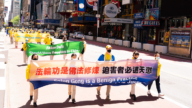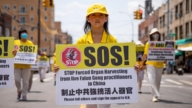【新唐人2014年12月16日讯】今年的12月10号,是联合国《世界人权宣言》通过66周年,也是《联合国禁止酷刑公约》通过30周年。东南亚国家,尤其是中国大陆、老挝、柬埔寨、朝鲜等国滥用酷刑的问题再次成为国际社会关注话题。
据《德国之声》报导,日前,国际人权观察组织大赦国际要求“彻底落实联合国在30年前就通过的反酷刑公约。”报导指出,全球有很多国家虽然制定了反酷刑法,但实际上仍继续着非人道的行为。
反酷刑公约,又称联合国禁止酷刑公约,自1984年12月10号联合国大会通过公约草案后,已经有146个缔约国签署了这一条约。尽管公约的第2条明文要求各缔约国必须在管辖领土内,防止和避免出现酷刑行为。但人权组织发现,在一些缔约国中,酷刑仍然非常普遍的存在着,其中最严重的就是中国、朝鲜、老挝、柬埔寨、缅甸等共产极权国家。
对此,美国华府人权律师叶宁也指出,目前,有大量的证据证明,中国大陆是世界上实行酷刑最大规模、记录最恶劣的国家。
美国华府人权律师叶宁:“特别是在1999年7月镇压法轮功以后,酷刑更是达到了登峰造极的地步——酷刑达到如果活摘人体器官的话,那就是最疯狂、最极端的一种酷刑行为,实际上正在受到自由人类和国际社会的调查和谴责。在这种情况下,中国作为一个普遍实施酷刑的国家,已经成了世界的公认了,无需太多的证明。”
法轮功学员贾亚珲曾在辽宁省马三家女子劳动教养院被非法关押多年,回想起在狱中受到的酷刑,贾亚珲至今不寒而栗。
法轮功学员贾亚珲:“我经历的有大挂、电击、还有一种就是把人吊起来,还有一种倒挂,它把人整个大头朝下挂着。 还有我看到有的人绑‘死人床’,有的用牙签扎在手指肚,还有老虎凳。还有因为在劳教所嘛,它肯定在卫生各个方面不好,有传染病啊,很多人身上起疥,就是那种传染病,他们用那个铁刷子刷身上⋯⋯”
此外,很多律师以及受过酷刑迫害的当事人还证明,在中国大陆的监狱、劳教所等关押场所里,女性往往要承受侵犯女性尊严的刑罚。
贾亚珲:“就是先把人绑在床上,四肢不能动,身体呈九十度角度状态,然后他们会用电棍顺着腋窝、乳房、腰的后部就是对着肾的位置,他们会不停的电击那个位置,再往下就是阴部,大腿内侧啊,他就找你敏感部位,不停的电。 最严重的时候,不让人穿衣服,你是(法轮功)学员嘛。本来是女子劳教所,但他们说很多男警察在里面,根本就一点尊严都没有了。”
大陆维权律师唐吉田:“女性有时候,一些当事人陈述,会有性骚扰啊,甚至个别出现性侵。包括有时办案人员丧失伦理底线,用一些物体对女性隐秘部位进行反复碰触,甚至用警棍去击打啊,有时候是带电的。”
12月9号,美国参议院情报委员会(Senate Intelligence Committee)发布了关于中央情报局(CIA)审讯恐怖主义嫌疑人的报告,中共官方媒体对此进行了大肆报导和抨击。联合国酷刑问题特别报告员门德斯(Juan Méndez),在接受《德国之声》采访时说,他对美国参议院公布酷刑报告表示赞许,同时希望中国、伊朗和俄罗斯等存在严重人权问题的国家,也应该公布本国的酷刑报告。
外界普遍认为,一贯在人权问题上进行掩盖和封锁的中共当局,不会同意联合国这一要求。而大陆维权律师唐吉田认为,中共当局即使同意公布酷刑报告,也不会将真实情况曝光。
唐吉田:“我倒不觉得它绝对不公布,有可能它在一定条件下它也会公布,但是这些资料的真实性、完整性、可核查性可能很难保证。另外,可能国际上一些人权工作者、人权机构想在中国大陆获取第一手资料、真实的信息恐怕是非常困难的。”
叶宁指出,中共当局签署反酷刑公约的目的,并不是为了履行义务,而是一种作秀和在国际公共关系中的一种姿态。国际社会和人权组织对中共的任何呼吁和规劝都是无用的,因为流氓无产专政是无法离开酷刑而存在的。
采访/易如 编辑/张天宇
Torture in China Highlighted During the 30th Anniversary
of Adopting UN Convention against Torture.
Dec.10 marks the 66th anniversary of the adoption
of United Nations’ Universal Declaration of Human Rights,
celebrates the 30th anniversary
and the 30th anniversary to the adoption of Convention against
Torture and Other Cruel, Inhumane or Degrading Treatment
or Punishment, by the United Nations General Assembly.
Southeast Asian countries, especially the abuse of torture in China,
Laos, Cambodia, North Korea and other countries,
once again became the topic of concern by the
international community.
According to “Deutsche Welle" a few days ago, Amnesty
International, an international organisation
for the human rights watch, requires
“A thorough implementation of the Convention against
Torture adopted by the United Nations 30 years ago."
The report says, although many countries around the world have
developed anti-torture laws, some countries still continue
to commit inhumane acts.
The Convention Against Torture is also known as
the Convention against Torture and Other Cruel,
Inhuman or Degrading Treatment or Punishment.
Since the UN General Assembly adopted the draft
convention on Dec. 10 of 1984,
146 State Parties have signed this convention.
The Article 2 of the Convention expressly requires
all signed state parties shall prevent and avoid acts
of torture within the territorial jurisdiction.
However, human rights groups found that
in some signed states, torture is still very prevalent,
especially in countries such as China, North Korea, Laos,
Cambodia, Myanmar and other communist totalitarian countries.
US human rights lawyer Ye Ning pointed out, at present,
plenty of evidence proves that China is found
to be the biggest violator of torture (in the world).
Ye Ning: “Especially the persecution of Falun Gong
since July 1999, torture in China reached a pinnacle status –
if torture reached in to the realm of human organ harvesting
from living people,
then it is the craziest, most extreme form of torture.
In fact, human freedom and the international community are
investigating and condemning such organ harvesting crimes.
Under such circumstances, China as a nation, with a universal
existence of torture, has become recognised in the world,
without much need for additional proof."
Falun Gong practitioner Jia Yahui had been detained
in Masanjia Women’s Labor Camp of Liaoning Province
for many years.
When Jia Yahui recalls her experiences of being tortured
in prison, she still trembles with fear.
Falun Gong practitioner Jia Yahui: “I experienced torture, such
as long periods of being hung up in various ways, upside
down etc and electric shocks to various parts of my body.
I saw some others tied to the"Dead Bed", toothpicks
were stuck under finger nails, and others subjected to
the “Tiger Bench".
Also, the hygiene in these places in unsavoury at best.
Infectious diseases abound and many people suffered
scabies which is infectious,
and they used the iron-brush to brush the body.
Many people, including lawyers, were subjected to torture,
also the women who had to endure violations
of their dignity.
Jaya Hui: “They tied women to a bed, limbs cannot move
and the body was at a status of right angles.
Then they used electric batons to shock the armpits, breasts,
and particularly the rear waist in the position
of the kidney’s without interruption.
They also shocked the private parts, the inner thighs etc.
They looked for the sensitive parts to shock.
At worst, we were not allowed to wear clothes,
because we are (Falun Gong) practitioners.
Even if that is a women’s labor camp,
there are still lots of male police working there.
So we have so little dignity."
Mainland human rights lawyer Mr Tang Jitian:
“Some women clients said there was sexual harassment,
even sexual assault.
This included some individual investigators sometimes
going below the basic ethical bottom line,
using some objects to repeatedly touch the hidden parts
of the female body, even using electric batons
to shock these parts."
Dec. 9, the US Senate Intelligence Committee released
a report on the Central Intelligence Agency (CIA)
interrogation of terrorism suspects,
and China’s official media gave
an extensive coverage and criticism.
UN Special Rapporteur on Torture Juan Méndez
told the “Deutsche Welle" in an interview, that he praised
the US Senate in publishing these reports of torture,
but also hoped China, Iran, Russia and other countries,
which all have serious human rights problems,
also should publish their reports on torture.
The public widely believes that the Chinese authorities (CCP),
who are well known for concealing human rights issues,
would not agree to this request of the United Nations.
The mainland human rights lawyer Tang Jitian believes
that even if the Chinese authorities agreed to publish
reports of torture, they will not expose
the true torture situation.
Tang Jitian: “I do not think they will not release
the torture situation, and it is possible to publish
under certain conditions.
But the data’s authenticity, integrity and verifiability
may be difficult to guarantee.
In addition, if some international human rights workers
and human rights organisations want to obtain first-hand
information on China,
the real information might be very difficult to obtain."
Ye Ning pointed out that the purpose
of the Chinese authorities signing
the Convention Against Torture,
is a show and a stance in international public relations
rather than for fulfilling their obligations.
It is useless for the international community
and human rights organisations to make any appeals
and exhortations to the CCP,
because rogue proletarian dictatorship is unable to exist
without the tortures for persecuting innocent people.
Interview/YiRu Edit/Zhang Tianyu

























